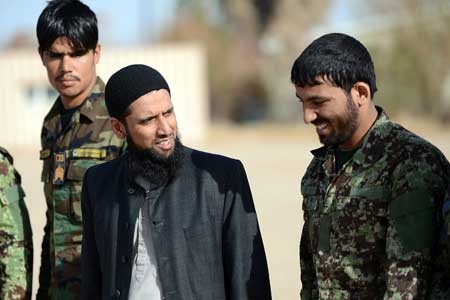
War is a word that often evokes anxious feelings of terror, weapons, violence, hatred, and death. The word soldier often evokes the image of a person who is given the task of protecting their country from the conflict of the war; they become the powerful face of war.
 It is not common for the average person to dwell on the intense training and astounding physical endurance to become a soldier and the enormous amount of mental preparation. To be able to go to an unfamiliar country and have to kill people, if necessary, takes a certain mentality that the average person does not have. In training, therefore, soldiers must transform their minds from the common civilian to someone who is capable of doing anything their superiors tell them to, regardless of how difficult or brutal. The right training is absolutely crucial because it could mean the difference between dedicated soldiers and killing machines. By being asked to commit morally difficult acts without any question, is it inevitable they will become killing machines? An inside look into the United Kingdom’s Royal Armed Forces gives an answer to this question and peers into the minds of the soldiers protecting this country.
It is not common for the average person to dwell on the intense training and astounding physical endurance to become a soldier and the enormous amount of mental preparation. To be able to go to an unfamiliar country and have to kill people, if necessary, takes a certain mentality that the average person does not have. In training, therefore, soldiers must transform their minds from the common civilian to someone who is capable of doing anything their superiors tell them to, regardless of how difficult or brutal. The right training is absolutely crucial because it could mean the difference between dedicated soldiers and killing machines. By being asked to commit morally difficult acts without any question, is it inevitable they will become killing machines? An inside look into the United Kingdom’s Royal Armed Forces gives an answer to this question and peers into the minds of the soldiers protecting this country.
Imam Asim Hafiz is the Islam advisor to the UK Armed Forces. He believes that “the solution to half of the world’s problems is understanding and education and half of the world’s problems are from ignorance. The more we can humanise and come together as people and begin to respect each other’s beliefs, values and principles. Then the quicker we will get over people feeling split.”
Beginning as a Muslim chaplain to the soldiers, he knows exactly what goes on in the minds of soldiers, both preparing for war and fighting in it. In an interview, Hafiz shared some feelings and experiences he had in the past few years in his role in the war, experiences which had a strong underlying theme: the humanity present in every UK soldier.
Asim Hafiz indicated that, in addition to the psychological and physical toll, war “brings out a sense of responsibility and spirituality you might not see in the general public. They see issues like life and death far more clearly than, say, those on the street”.
On the one hand, these youths are being exposed to things that can damage them; yet it is actually opening their minds in a way that gives them a global and humanistic understanding that benefits their personal growth and promotes positive values for the country they are protecting. If the face of war exemplifies these positive values, the country can only become stronger and more unified in an altruistic goal.
“So I always say to people that soldiers are the best humanitarians I’ve met. Again, people might be confused, but primarily their role is to defend – defend their country and provide peace and security.” This goes against the common misconception that soldiers are desensitized and trigger happy. On the contrary, they have deep moral concerns for what they are doing. As he talked to soldiers, Hafiz noted “that people sometimes say, I’m scared about deploying. I used to initially say, are you worried about dying? They’d say ‘no, no, no. I’m not worried about dying, I’m worried about killing.’”
He also indicated his own personal benefit from these experiences, “I’ve grown more in my own faith from this experience – being able to meet the people I’ve met and being put in the position where I have to engage emotionally and mentally with topics and dilemmas I may not have had to deal with outside of this job. It has certainly strengthened by faith. I have not got all the answers yet. But at least I’m engaging with those with moral questions and dilemmas that exist when working for an organisation that is trained to kill.”
As Remembrance day looms on this particularly important anniversary year, it is important to not only admire the beautiful poppies displayed in the Tower of London and on everyone’s clothing, but to also take Asim Hafiz’s words of humanity to heart. These poppies represent a group of people who were morally advanced for their time, who not only fought to physically protect this country, but to also sent a standard of respectable values that all people can reap the benefit of. So this year, amongst the memorial ceremonies and silences, take a moment to reflect on your own humanity and honour these fallen soldiers with good deeds and compassionate thoughts. That is how the memory of them will live on.